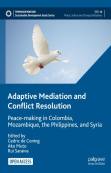Adaptive Mediation and Conflict Resolution: Peace-making in Colombia, Mozambique, the Philippines, and Syria

Since the 1990s, mediation and conflict resolution processes have often been related to liberal peacebuilding interventions, helping first to bring the fighting to an end with ceasefire agreements and then shaping the post-conflict phase through more comprehensive peace agreements. A characteristic feature of this period is that the content of the peace agreements typically reveals more about the liberal peace values of the mediators than they do about the values or context-specific interests of the parties to the conflict. Most of these peace agreements share at their core a similar logic and structure, deriving from a determined-designed model, which tends to be linear, staged, normative, and individualistic in orientation. The reality is that, for the most part, domestic actors did not have control over these mediation processes, and third-party mediation became associated with imposed conflict transformation and power mediation. As a result, tensions frequently reemerge not long after mediation processes are completed. There is thus a growing sense that the mainstream approach to mediation and peace-making is unable to address the changing conflict landscape effectively, and there is a growing interest in exploring alternative approaches to peace-making that can enrich the peacemaking toolbox available to mediators around the world.
This book introduces adaptive mediation as an alternative approach that enables mediators to go beyond liberal peace mediation or other determined-design models of mediation in the context of contemporary conflict resolution and peace-making initiatives. Adaptive mediation is an approach to mediation that has its foundations in complexity theory, and that is specifically designed to cope with highly dynamic conflict situations characterized by uncertainty and a lack of predictability. Adaptive mediation is also a facilitated mediation process whereby the content of agreements emerges from the parties to the conflict themselves, informed by the context within which the conflict is situated. In protracted and recurrent conflicts, it is difficult to establish a sustainable ceasefire, and thus, the adoption of a pragmatic approach that matches the local context of the conflicts becomes critical. This book further provides valuable insights into the complex dynamics of the mediation landscape by presenting both a theoretical framework for adaptive mediation and practical means of conflict resolution addressing the complexity and uncertainty faced by mediators in contemporary armed conflicts.
All four cases studies in this book support the adaptive mediation hypothesis that, when the aim is a self-sustainable peace agreement, mediators should limit their role to process facilitation, protect parties from external interests and agendas, foster inductive processes that maximize the capacity of the parties to self-organize, and help them generate agreements that are rooted in the local context. The Syrian case demonstrated how external interference disrupted the ability of the parties to self-organize, especially at several critical potential tipping points, and how this undermined the ability of several highly experienced mediators, and the parties themselves, to find ways to settle on a pathway to end the conflict. In contrast, the mediation experiences in Colombia, Mozambique, and the Philippines have shown that the more the parties (or insider neutrals associated with them) participate in generating a shared conflict analysis, identifying options, and exploring pathways to agreements, the more likely the outcome is to reflect indigenous narratives and perspectives relevant to the context, rather than the assumptions, interests, and biases of the external mediators. Adaptive mediation regards the emergence of this self-organizing process among the parties participating in the conflict as a crucial pre-cursor for self-sustainable peace.
This open access book is an output of the research project titled “Contextualizing International Cooperation for Sustaining Peace: Adaptive Peacebuilding Pathways,” conducted by JICA Ogata Sadako Research Institute for Peace and Development.
scroll